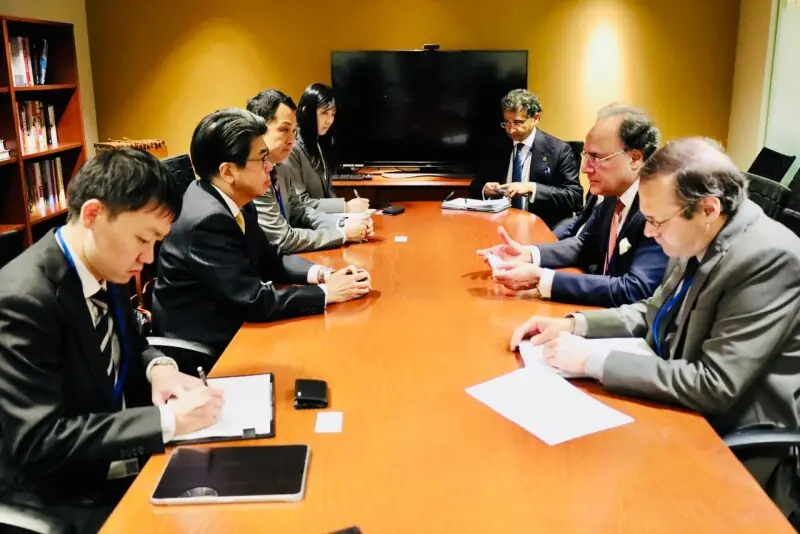Strengthening economic ties with major economic partners, Pakistan secured a significant boost in investor confidence after the Japan Bank for International Cooperation (JBIC) agreed to join the Reko Diq lender group, during Finance Minister Muhammad Aurangzeb’s series of high-level meetings in Washington DC with officials from the US, China, and Japan.
Aurangzeb continued his engagements on the fourth day of his visit to Washington DC, where he is attending the Annual Meetings of the International Monetary Fund (IMF) and the World Bank Group, read a statement released on Friday.
During his interaction, the finance minister met with Nobumitsu Hayashi, Governor of the Japan Bank for International Cooperation (JBIC), and “welcomed JBIC’s formal commitment to join the Reko Diq lender group, noting that this move would strengthen investor confidence and encourage Japanese businesses to expand their presence in Pakistan”.
Aurangzeb briefs Saudi counterpart on PIA, airport privatisation drive
He emphasised the government’s priority on ensuring security for foreign investors and identified new avenues for bilateral cooperation, read the statement.
Aurangzeb held a productive meeting with Congressman French Hill, Chairman of the US House Financial Services Committee.
Both sides discussed avenues to deepen Pakistan–U.S. economic and financial cooperation, with particular emphasis on the digitisation of financial services, the new economy, mineral development, and broader IT collaboration.
Earlier, the finance minister delivered a keynote address at the Atlantic Council on “Reform Efforts in Pakistan & the Challenges Ahead,” where he highlighted the reform agenda’s external validation by the IMF and rating agencies.
He detailed the reforms planned for the Federal Board of Revenue (FBR), focusing on people, process, and technology.
The finance minister also met with the S&P Global team and appreciated the ratings upgrade, noting that all three major rating agencies are now aligned in their outlook on Pakistan.
He termed these developments as further evidence of the external confidence in the government’s reform trajectory. During the meeting, the minister presented an overview of fiscal, monetary, and external sector developments and reaffirmed Pakistan’s commitment to continued engagement with S&P.
Later, Aurangzeb delivered a keynote address at a Regional Roundtable on Digital Transformation in Tax Administration, organised by the World Bank.
He shared details of the Transformation Plan for the FBR aimed at building a modern, transparent, and efficient tax administration. Highlighting that tax collection increased from 8.8% of GDP in 2024 to 10.24% in 2025, he elaborated on the end-to-end digitalisation of core processes, use of digital tools for economic integration and documentation, and Pakistan Customs’ initiatives to curb under-invoicing and enhance trade facilitation, read the statement.
The minister also emphasised ongoing efforts to strengthen human resource capacity and optimise the FBR’s organisational structure.
In a meeting with Bangladesh Special Envoy Lutfey Y. Siddiqi, the finance minister reaffirmed the critical role of the private sector in leading economic growth, supported by a public sector ecosystem. Both officials agreed on the IT sector’s game-changing potential to create quality graduate jobs and emphasised the need for knowledge-sharing and capacity-building.
Finally, the finance minister addressed the JP Morgan Investment Seminar on Pakistan’s Economic & Monetary Policy Outlook, briefing investors on the positive momentum of the economy, which is fueled by sound macro management and enhanced fiscal and external sector stability.


